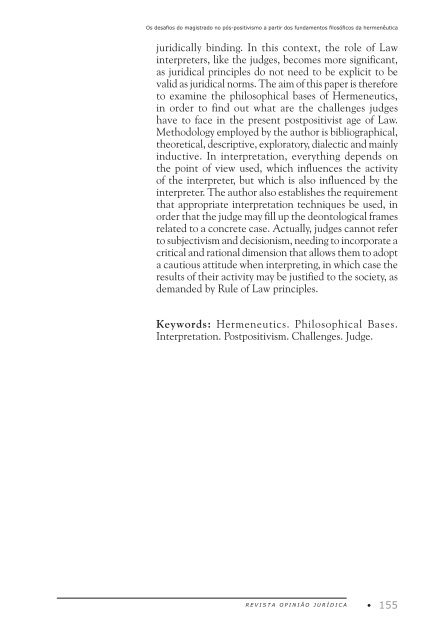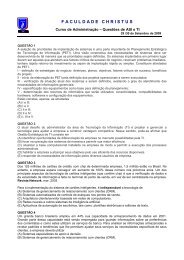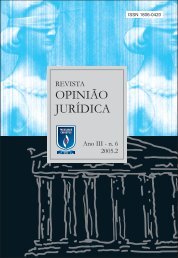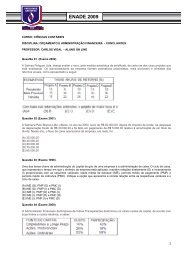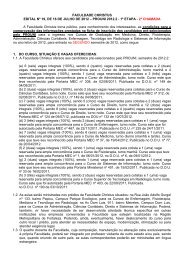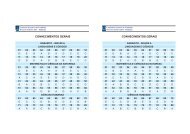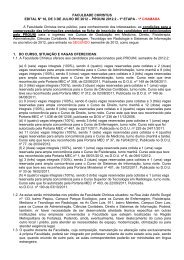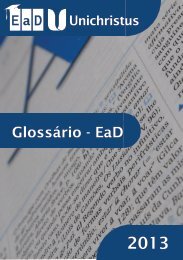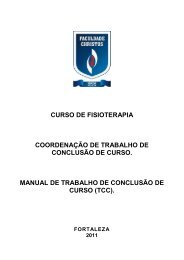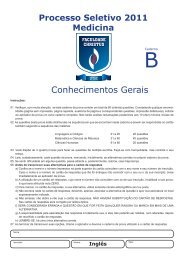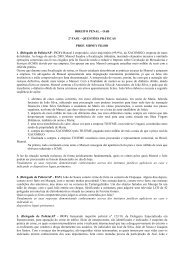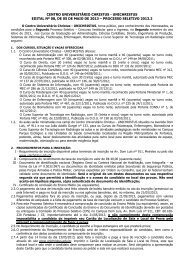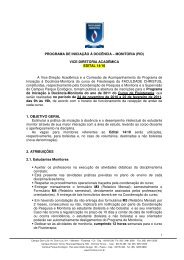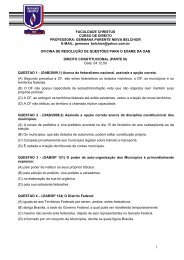- Page 1 and 2:
Ano VIII - n. 12 2010 ISSN 1806-042
- Page 3 and 4:
Ficha Catalográfica Opinião Jurí
- Page 5 and 6:
Opinião Jurídica Revista do Curso
- Page 7 and 8:
Opinião Jurídica têm a honra de
- Page 9 and 10:
Estado e direito no pensamento de H
- Page 11 and 12:
Christianny Diógenes Maia A atuaç
- Page 13 and 14:
Christianny Diógenes Maia vimentos
- Page 15 and 16:
Christianny Diógenes Maia Apesar d
- Page 17 and 18:
Christianny Diógenes Maia No Brasi
- Page 19 and 20:
Christianny Diógenes Maia Por outr
- Page 21 and 22:
Christianny Diógenes Maia portante
- Page 23 and 24:
Christianny Diógenes Maia em uma p
- Page 25 and 26:
Christianny Diógenes Maia In: Estu
- Page 27 and 28:
Christianny Diógenes Maia parte co
- Page 29 and 30:
O PAPEL DOS MOVIMENTOS SOCIAIS COMO
- Page 31 and 32:
Clovis Renato Costa Farias 30 n. 12
- Page 33 and 34:
Clovis Renato Costa Farias tizaçã
- Page 35 and 36:
Clovis Renato Costa Farias 34 n. 12
- Page 37 and 38:
Clovis Renato Costa Farias Com rela
- Page 39 and 40:
Clovis Renato Costa Farias nistéri
- Page 41 and 42:
Clovis Renato Costa Farias que cost
- Page 43 and 44:
Clovis Renato Costa Farias reformis
- Page 45 and 46:
Clovis Renato Costa Farias CONCLUS
- Page 47 and 48:
Clovis Renato Costa Farias ____. Pa
- Page 49 and 50:
Clovis Renato Costa Farias 48 n. 12
- Page 51 and 52:
Daniel Viana Teixeira uma sociedade
- Page 53 and 54:
Daniel Viana Teixeira importância
- Page 55 and 56:
Daniel Viana Teixeira concerne à q
- Page 57 and 58:
Daniel Viana Teixeira de seu destin
- Page 59 and 60:
Daniel Viana Teixeira Weber identif
- Page 61 and 62:
Daniel Viana Teixeira Nessa relaç
- Page 63 and 64:
Daniel Viana Teixeira previdenciár
- Page 65 and 66:
Daniel Viana Teixeira O tratamento
- Page 67 and 68:
Daniel Viana Teixeira conveniente q
- Page 69 and 70:
Daniel Viana Teixeira CONCLUSÃO Di
- Page 71 and 72:
Daniel Viana Teixeira São Paulo: M
- Page 73 and 74:
Daniel Viana Teixeira autonomizar e
- Page 75 and 76:
Daniel Viana Teixeira naturais, a p
- Page 77 and 78:
Daniel Viana Teixeira 30 “O siste
- Page 79 and 80:
Daniel Viana Teixeira 78 n. 12 - 20
- Page 81 and 82:
Elisianne Campos de Melo Soares e G
- Page 83 and 84:
Elisianne Campos de Melo Soares e G
- Page 85 and 86:
Elisianne Campos de Melo Soares e G
- Page 87 and 88:
Elisianne Campos de Melo Soares e G
- Page 89 and 90:
Elisianne Campos de Melo Soares e G
- Page 91 and 92:
Elisianne Campos de Melo Soares e G
- Page 93 and 94:
Elisianne Campos de Melo Soares e G
- Page 95 and 96:
Elisianne Campos de Melo Soares e G
- Page 97 and 98:
Elisianne Campos de Melo Soares e G
- Page 99 and 100:
98 DISCIPLINAS PROPEDÊUTICAS NO CO
- Page 101 and 102:
Fayga Silveira Bedê, Carla Marques
- Page 103 and 104:
Fayga Silveira Bedê, Carla Marques
- Page 105 and 106: Fayga Silveira Bedê, Carla Marques
- Page 107 and 108: Fayga Silveira Bedê, Carla Marques
- Page 109 and 110: Fayga Silveira Bedê, Carla Marques
- Page 111 and 112: Fayga Silveira Bedê, Carla Marques
- Page 113 and 114: Fayga Silveira Bedê, Carla Marques
- Page 115 and 116: Fayga Silveira Bedê, Carla Marques
- Page 117 and 118: Fayga Silveira Bedê, Carla Marques
- Page 119 and 120: 118 CLÁUSULAS GERAIS PROCESSUAIS n
- Page 121 and 122: Fredie Didier Jr. mente na constru
- Page 123 and 124: Fredie Didier Jr. Outro elemento de
- Page 125 and 126: Fredie Didier Jr. A existência de
- Page 127 and 128: Fredie Didier Jr. MARINONI. Luiz Gu
- Page 129 and 130: Fredie Didier Jr. 12 LARENZ, op. ci
- Page 131 and 132: Fredie Didier Jr. GARSTKA, Hansjür
- Page 133 and 134: Germana Parente Neiva Belchior e Mi
- Page 135 and 136: Germana Parente Neiva Belchior e Mi
- Page 137 and 138: Germana Parente Neiva Belchior e Mi
- Page 139 and 140: Germana Parente Neiva Belchior e Mi
- Page 141 and 142: Germana Parente Neiva Belchior e Mi
- Page 143 and 144: Germana Parente Neiva Belchior e Mi
- Page 145 and 146: Germana Parente Neiva Belchior e Mi
- Page 147 and 148: Germana Parente Neiva Belchior e Mi
- Page 149 and 150: Germana Parente Neiva Belchior e Mi
- Page 151 and 152: Germana Parente Neiva Belchior e Mi
- Page 153 and 154: Germana Parente Neiva Belchior e Mi
- Page 155: Germana Parente Neiva Belchior e Mi
- Page 159 and 160: Gretha Leite Maia e Victor Menezes
- Page 161 and 162: Gretha Leite Maia e Victor Menezes
- Page 163 and 164: Gretha Leite Maia e Victor Menezes
- Page 165 and 166: Gretha Leite Maia e Victor Menezes
- Page 167 and 168: Gretha Leite Maia e Victor Menezes
- Page 169 and 170: Gretha Leite Maia e Victor Menezes
- Page 171 and 172: AS SÚMULAS DE JURISPRUDÊNCIA E O
- Page 173 and 174: Jânio Pereira da Cunha “toda e q
- Page 175 and 176: Jânio Pereira da Cunha ser julgado
- Page 177 and 178: Jânio Pereira da Cunha Noutras pal
- Page 179 and 180: Jânio Pereira da Cunha que, a prin
- Page 181 and 182: Jânio Pereira da Cunha utilizada e
- Page 183 and 184: Jânio Pereira da Cunha processuais
- Page 185 and 186: Jânio Pereira da Cunha continuarem
- Page 187 and 188: Jânio Pereira da Cunha VALENTE NET
- Page 189 and 190: Jânio Pereira da Cunha 39 TORNAGUI
- Page 191 and 192: A DEMOCRACIA NA ADMINISTRAÇÃO PÚ
- Page 193 and 194: Juraci Mourão Lopes Filho e exigê
- Page 195 and 196: Juraci Mourão Lopes Filho É essa
- Page 197 and 198: Juraci Mourão Lopes Filho propicio
- Page 199 and 200: Juraci Mourão Lopes Filho também
- Page 201 and 202: Juraci Mourão Lopes Filho 4 O NEOC
- Page 203 and 204: Juraci Mourão Lopes Filho mento. E
- Page 205 and 206: Juraci Mourão Lopes Filho essas no
- Page 207 and 208:
Juraci Mourão Lopes Filho 206 n. 1
- Page 209 and 210:
Juraci Mourão Lopes Filho 1 ARAÚJ
- Page 211 and 212:
ESTADO E DIREITO NO PENSAMENTO DE H
- Page 213 and 214:
Nagibe de Melo Jorge Neto Kelsen en
- Page 215 and 216:
Nagibe de Melo Jorge Neto 4 OS ÓRG
- Page 217 and 218:
Nagibe de Melo Jorge Neto Levando-s
- Page 219 and 220:
Nagibe de Melo Jorge Neto BIBLIOGRA
- Page 221 and 222:
220 O DIREITO AO CONHECIMENTO DA OR
- Page 223 and 224:
Nathalie Carvalho Cândido De acord
- Page 225 and 226:
Nathalie Carvalho Cândido 224 n. 1
- Page 227 and 228:
Nathalie Carvalho Cândido A import
- Page 229 and 230:
Nathalie Carvalho Cândido Nesta hi
- Page 231 and 232:
Nathalie Carvalho Cândido relativo
- Page 233 and 234:
Nathalie Carvalho Cândido 232 n. 1
- Page 235 and 236:
Nathalie Carvalho Cândido 4 EFEITO
- Page 237 and 238:
Nathalie Carvalho Cândido vez mais
- Page 239 and 240:
Nathalie Carvalho Cândido BRASIL.
- Page 241 and 242:
Nathalie Carvalho Cândido STOCO, R
- Page 243 and 244:
242 ACESSO À JUSTIÇA. NOVÍSSIMA
- Page 245 and 246:
Társis Silva de Cerqueira em garan
- Page 247 and 248:
Társis Silva de Cerqueira Com efei
- Page 249 and 250:
Társis Silva de Cerqueira 248 n. 1
- Page 251 and 252:
Társis Silva de Cerqueira BONAVIDE
- Page 253 and 254:
Társis Silva de Cerqueira 1 Cabe a
- Page 255 and 256:
Társis Silva de Cerqueira ninguém
- Page 257 and 258:
Társis Silva de Cerqueira empíric
- Page 259 and 260:
Társis Silva de Cerqueira 258 n. 1
- Page 261 and 262:
Tércio Aragão Brilhante Os ilíci
- Page 263 and 264:
Tércio Aragão Brilhante orgânica
- Page 265 and 266:
Tércio Aragão Brilhante especial
- Page 267 and 268:
Tércio Aragão Brilhante Essa libe
- Page 269 and 270:
Tércio Aragão Brilhante Outrossim
- Page 271 and 272:
Tércio Aragão Brilhante CAETANO,
- Page 273 and 274:
Tércio Aragão Brilhante 272 n. 12
- Page 275 and 276:
Carla Amado Gomes a natureza da rel
- Page 277 and 278:
Carla Amado Gomes pensamos numa per
- Page 279 and 280:
Carla Amado Gomes L’Environnement
- Page 281 and 282:
Carla Amado Gomes tui o paradigma (
- Page 283 and 284:
Carla Amado Gomes reparação dos d
- Page 285 and 286:
Carla Amado Gomes _______. Direito
- Page 287 and 288:
Carla Amado Gomes e, por outro lado
- Page 289 and 290:
Fabrice Bin constitutionnelle relat
- Page 291 and 292:
Fabrice Bin l’ensemble des textes
- Page 293 and 294:
Fabrice Bin 1.2.2 La confirmation p
- Page 295 and 296:
Fabrice Bin En effet, lors des déb
- Page 297 and 298:
Fabrice Bin 2.2 Une approche très
- Page 299 and 300:
Fabrice Bin à la Charte par ses r
- Page 301 and 302:
Fabrice Bin Préambule de la Consti
- Page 303 and 304:
Fabrice Bin « Art. 3. - Toute pers
- Page 305 and 306:
Fabrice Bin 19 P. Gélard, Rapport
- Page 307 and 308:
Fabrice Bin membres de la commissio
- Page 309 and 310:
O DIREITO SUBJECTIVO AO AMBIENTE: U
- Page 311 and 312:
Luis Carlos Batista Parte da nossa
- Page 313 and 314:
Luis Carlos Batista e mais importan
- Page 315 and 316:
Luis Carlos Batista (3) Statement a
- Page 317 and 318:
Luis Carlos Batista do outro é adm
- Page 319 and 320:
Luis Carlos Batista 318 n. 12 - 201
- Page 321 and 322:
Luis Carlos Batista Em bom rigor, o
- Page 323 and 324:
Luis Carlos Batista × O direito de
- Page 325 and 326:
Luis Carlos Batista Terminamos com
- Page 327 and 328:
Luis Carlos Batista LARENZ, K. Allg
- Page 329 and 330:
Luis Carlos Batista 47 Sem esconder
- Page 331 and 332:
330 O AVESSO DOS DIREITOS HUMANOS P
- Page 333 and 334:
Paulo Ferreira da Cunha sujeito a u
- Page 335 and 336:
Paulo Ferreira da Cunha mas também
- Page 337 and 338:
Paulo Ferreira da Cunha A escravatu
- Page 339 and 340:
Paulo Ferreira da Cunha tural (não
- Page 341 and 342:
Paulo Ferreira da Cunha confiar pes
- Page 343 and 344:
Paulo Ferreira da Cunha Como vimos,
- Page 345 and 346:
Paulo Ferreira da Cunha L’Action
- Page 347 and 348:
346 n. 12 - 2010 ENTREVISTA COM MAR
- Page 349 and 350:
Por Tércio Aragão Brilhante Tradi
- Page 351 and 352:
Por Tércio Aragão Brilhante 65 an
- Page 353 and 354:
Por Tércio Aragão Brilhante O mur
- Page 355 and 356:
Por Tércio Aragão Brilhante aquel
- Page 357 and 358:
Elementos textuais: Modelo A: Model
- Page 359:
Artigos em revistas, jornais etc. M
- Page 362:
ISSN 1806-0420 9 771806 042006 1 2>


